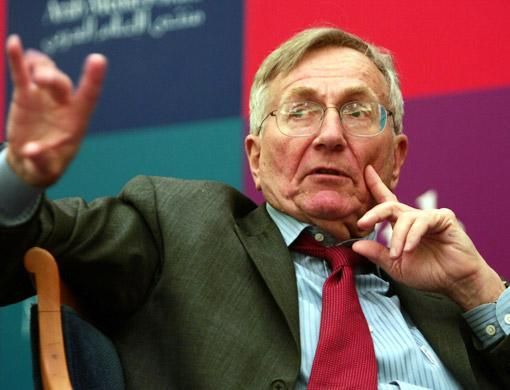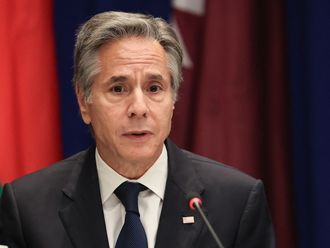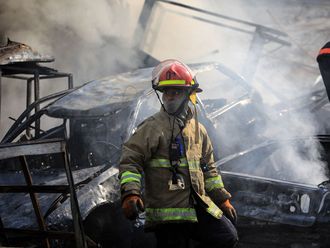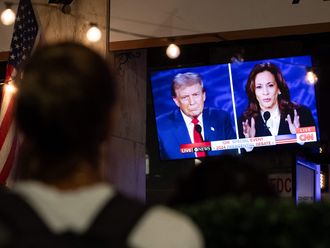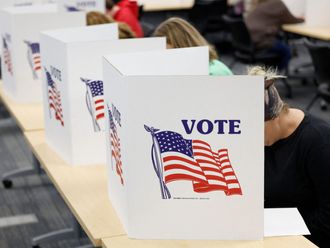Dubai: Pulitzer prize-winning American investigative journalist Seymour Hersh recently said that former US vice-president Dick Cheney headed a secret assassination wing that targeted America's enemies abroad.
Video: Seymour Hersh interview
Gulf News catches up with him on his trip to Dubai for the Arab Media Forum to ask about those revelations as well as issues concerning Barack Obama, Lebanon, Israel, Syria and Egypt.
GULF NEWS: You have spoken about an assassination unit that reported to Cheney called the Joint Special Operations Command (JSOC). There have been allegations that this unit was responsible for former Lebanese prime minister Rafik Hariri's assassination.
SEYMOUR HERSH: I can't verify [that]. What I said was, and what I have written more than once, is that there's a special unit that does high-value targeting of men that we believe are known to be involved in anti-American activities, or are believed to be planning such activities.
In Cheney's view this isn't murder, but carrying out the "war on terror". And in the view of me and my friends, including people in government, this is crazy. The vice president is committing a crime. You can't authorise the murder of people. And it's not just in Iraq and Afghanistan, it's in a lot of other countries, in the Middle East and in South Asia and North Africa and even central America.
In the early days, many of the names were cleared through Cheney's office. One of his aides, John Hanna, went on TV and acknowledged that the programme exists, and said killing these people is not murder but an act of war that is justified legally.
The former head of JSOC has just been named the new commander in charge of the war in Afghanistan, which is very interesting to me.
About Hariri, what I've always maintained - I was in the position of seeing and interviewing President Bashar Al Assad on the day Hariri was killed in February 2005 - it seemed clear to me that he knew nothing about it. But I never wrote anything about it, even the fact that I was there, because I had no empirical or factual basis for knowing whether he was involved or not, and I never did. And I decided to wait for the investigations and they have come up with no concrete evidence that Syria did it. Despite the fact that one of the earlier investigators speculated that he did, he didn't know.
Could JSOC have been responsible?
No. Hariri, America. No. Impossible. There was no reason. JSOC's responsibility was to go after what they call high-value targets.
Can you name the Middle East countries they operated in?
No. I can't, so I've said that there were 12 countries and I think there's many more, but you don't have to be a rocket scientist to make good guesses. I certainly know they've operated in Iraq and Afghanistan. They've talked about that. The point is that the men doing their jobs often don't like what they're doing. They're professionals and are very skilled at what they do. Some are Navy Seals who have been trained to do underwater stuff. What are they doing running around mountain ranges hurting people?
I don't fault the men but the leadership, the president who thinks that "war on terror" means he can call for anyone's death based on what I think is often fraudulent evidence. This is painful for me in a way because I get a lot of people in the military who are very angry at me for doing this. But that's my job.
How closely is the new US administration looking at your revelations.
Publicly they don't say anything at all. It's obvious I have credibility because I've written things that have turned out right. My colleagues at the press corps often don't follow up, not because they don't want to but because they don't know who to call. If I'm writing something on the Joint Special Operations Command, which is an ostensibly classified unit, how do they find it out? The government will tell them everything I write is wrong or that they can't comment. It's easy for those stories to be dismissed. I do think the relationship with JSOC is changing under Obama. It's more under control now.
How close was Syria to a peace deal with Israel before the Gaza war broke out?
I think closer than it is now. That's for sure. They had an agreement on most of the modalities. It's always the last [details] in any agreement [that take time]. In 2000 they came close to an agreement but it was about a 100 metres or so to the Sea of Galilee [that they disagreed on].
But I think things were really going along very well, which makes the Israeli attack all the more upsetting. If you remember, [Turkish Prime Minister Recep Tayyip] Erdogan got very angry at [the World Economic Summit at] Davos [earlier this year]. He got into an argument with [Israeli President Shimon] Peres and walked out. And the reason is that, as I am told, the discussions [between the Syrians and Israelis] were much deeper. There were even almost direct discussions between [former Israeli prime minister Ehud] Olmert and Assad. They were all on the same phone together. These conversations took place within a week of the bombing of Gaza. So there was enormous rage and the Turks were very upset with Olmert. He obviously knew about the bombing and hadn't communicated that. He was talking peace knowing that the bombing would break off the peace talks.
An article you wrote earlier claimed that American money was going to Salafist groups in Lebanon that were affiliated with Al Qaida to act as a counter-weight to Hezbollah. Is that still happening?
That caused a lot of trouble three years ago. It wasn't clear if it was American money. Certainly Saudi money and the belief was that some of the American money was being co-mingled. Did anybody ever say this is going to go to this group? No. But they [the Americans] put it in a fund, you know there's a way to do it on the inside, to divorce yourself from reality.
Is that attitude changing under Obama?
I think what's changed is that mostly the Americans are out of it and the Saudis are in it. And before the election there's a tonne of money going into Lebanon right now.
There has been talk of setting up of a militant Shia party as an alternative to Hezbollah. What do you know about that?
I don't know much about it. I would hate to be an alternative party to Hezbollah. It's a pretty popular group. They do an awful lot of public work. They certainly are close to Iran. But one of the fascinating things about the Obama administration is that they've been communicating indirectly to Syria and other places that the old notion that Iran controls Hezbollah and then controls Syria, which controls Hamas, the whole notion that these non-state groups are under direct control of any country is ridiculous. They have their own aspirations. They won't always do what Iran wants.
Do you think Obama's trip to Egypt can be perceived as a message of support to America's Arab allies and the Sunni world?
I'm still far from having any insight because the trip and schedule were announced late, which is interesting. But you can guess that it's meant to calm down the nervousness about [the Shiias].
The Israelis have some nervousness about it, and when it comes to the issue of Sunni-Shia, Egypt is probably closer to Israel in its views of Iran than the rest of the Arab world. Egypt shares [with Israel] a residual fear of the Shia world. You remember how the Mubarak government initially supported Israel in its war against Lebanon. So did the Jordanians and the Saudis, to the amazement of many people.


